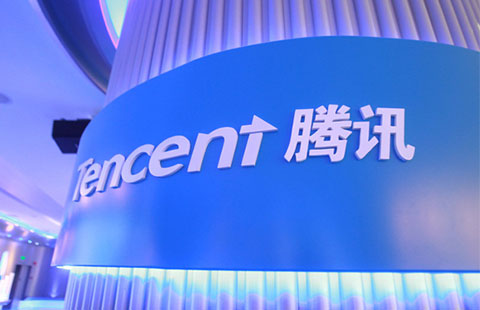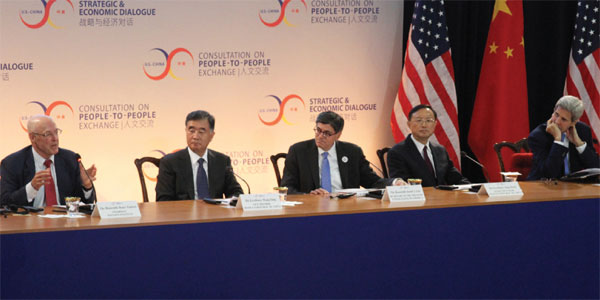Kerry praises US-China on climate efforts
Updated: 2015-06-24 12:04
By Amy He in Washington(China Daily USA)
|
||||||||
|
Leaders from China and the US discuss joint efforts to combat climate change in Washington on Tuesday. From left: former US Secretary of Treasury Henry Paulson, who moderated the discussion; Vice-Premier Wang Yang; Treasury Secretary Jacob Lew; State Councilor Yang Jiechi; Secretary of State John Kerry. The discussion was part of events on the opening day of the US-China Strategic and Economic Dialogue. [Photo by Amy He / China Daily] |
Secretary of State says two major polluters in world can have profound impact together
China and the United States have been working "extremely effectively together" since the two countries' historic joint announcement in 2013 on combating climate change, which presents both countries with great economic opportunities, US Secretary of State John Kerry said on Tuesday.
Commenting at a panel discussion at the 2015 US-China Strategic and Economic Dialogue, Kerry said that the two countries were locked in a "stalemate" on climate change, but since 2013 the US and China have opened up and cooperated, which has had a great impact on other countries.
"Because China and the United States are the world's two largest emitters today, when we make a decision to move on this, it has a profound impact," he said.
US Treasury Secretary Jack Lew, Chinese State Councilor Yang Jiechi and Chinese Vice-Premier Wang Yang participated in the discussion that was moderated by former US Treasury Secretary Henry Paulson.
Yang said that the announcement in November 2013 by presidents Xi Jinping and Barack Obama and "not only promoted our cooperation in tackling climate change, but also promoted our cooperation in green and low-carbon economic growth." At the same time, the announcement "brought a great deal of inspiration to the world," he added.
Obama said in the announcement that the US will reduce its carbon emissions by 26 percent to 28 percent in 2025, compared to levels in 2005. Xi said that China will peak its carbon emissions by 2030, the first time China has agreed to such a level.
Yang said China will continue to save energy and raise efficiency, increasing forest carbon stock, cutting carbon intensity, and focusing efforts on promoting a green economy. China and the US should work more closely on issues of shale gas, nuclear power, carbon capture and sequestration, and green trade, he said.
"We should work together to contribute to the global response to climate change. We need to work with the international community to ensure success at the Paris conference at the end of this year so that it can achieve big results," he said.
Lew and Wang emphasized that the economic implications of delaying action on climate change are significant, and that it's better for both countries to deal with the issues now before they become bigger financial burdens later.
"The cost of delay is very substantial. We have seen increasingly extreme weather, that has costs," Lew said. "We also have seen from studies that for every decade we delay, we increase the cost of dealing with climate change by 40 percent. So the reality is that the economic pressure is real and it's going to get more real as time goes on."
Wang said that the core of China's actions in tackling climate change from an economic perspective is to "shift its growth model."
"Nature has shown human beings the red light - that the traditional growth model is coming to its limit, and we must change consumption, change a way of life that is too extravagant," he said.
"We must change our philosophy of 'pollution first and solution later,'" he added
Representatives of both countries said that there are plenty of business opportunities in combating climate change, with Kerry saying that the $6 trillion energy market now has 4 billion to 5 billion active consumers, and if government policy can excite the marketplace, it will move immediately and create millions of jobs in the solar, wind and hydro sectors.
"The economic opportunities are not to be trifled with," he said.
In China, the environmental industry's output has grown 50 percent year-on-year, generating more than $700 billion. More than 750,000 new energy vehicles were sold last year, three times more than in 2013, giving growth opportunities to such companies as electric-vehicle manufacturers Tesla and BYD, according to Wang.
"I believe tackling climate change is a must for efforts to promote global economic recovery and sustainable development," he said.
China will release its INDC - an outline of a country's post-2020 climate actions - this month, according to Xie Zhenhua, China's special representative for climate change affairs. Xie said in a press briefing after the climate-change discussion that China's INDC will differ from those of other countries because it will announce a series of objectives in addressing climate change to 2030.
"Not only will we have objectives in our INDC, we also will cover a lot of policy issues and projects to reach these objectives. I believe after China's announcement of INDC, you will see our INDC objectives are quite ambitious," he said.
Joanna Lewis, associate professor of science at Georgetown University who focuses on China's environment, said that there are signs that the central government's policy is leading to creative actions in the provinces.
"I'm just back from a trip to several provinces in China and was amazed at the real actions being taken at the local level,"she told China Daily.
Charlene Cai contributed to this story.
amyhe@chinadailyusa.com
- Heat wave kills 748 people in Pakistan's Karachi
- S. Korea protests DPRK's sentencing of 2 detainees
- Myanmar's new ceasefire talks likely to be held in Thailand
- Earthquake-stricken Nepal all set to host reconstruction conference
- The world in photos: June 15-21
- Polish airline, hit by cyber attack, says all carriers are at risk

 Across Canada(June 26)
Across Canada(June 26)
 Turning metal waste into robot-like artwork
Turning metal waste into robot-like artwork
 Man breaks record for being buried alive
Man breaks record for being buried alive
 Ten photos you don't wanna miss - June 24
Ten photos you don't wanna miss - June 24
 Three ships stranded as tropical storm Kujira hits S China
Three ships stranded as tropical storm Kujira hits S China
 Top 10 most valuable Chinese brands of 2015
Top 10 most valuable Chinese brands of 2015
 Ten photos you don't wanna miss - June 23
Ten photos you don't wanna miss - June 23
 The world in photos: June 15-21
The world in photos: June 15-21
Most Viewed
Editor's Picks

|

|

|

|

|

|
Today's Top News
Xi: Bilateral ties should be kept on course
Chinese, US leaders meet with CEOs
Kerry praises US-China on climate efforts
Liu calls for more 'she power'
Vice-premier calls for more 'she power'
US spied on French presidents, officials, reveals Wikileaks
Australia commits $718m for China-initiated bank
BOC denies illegal activity in Italy
US Weekly

|

|








